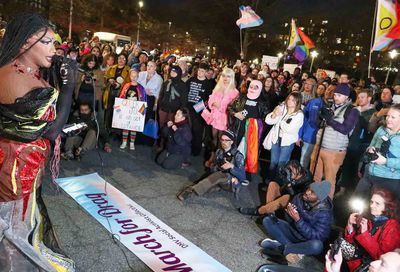Utah Judge Blocks State from Enforcing Transgender Sports Ban
Seven-member commission will determine individual trans athletes' eligibility to compete while ban is challenged in court.

A Utah judge has issued an order blocking the state’s law that prohibits transgender females from playing on girls’ sports teams.
On Friday, Judge Keith Kelly, of the Third District Court of Salt Lake County, issued a written injunction preventing the state from trying to enforce the law, which was approved by Republican lawmakers earlier this year, over the objections of Republican Gov. Spencer Cox, who initially vetoed the measure.
In May, three transgender athletes and their families enlisted the help of the American Civil Liberties Union of Utah, the National Center for Lesbian Rights, and the law firm Wilson Sonsini Goodrich & Rosati in their case. They then sued over the law, alleging it is discriminatory.
In their complaint the plaintiffs argued that denying transgender students an equal opportunity to play school sports according to their gender identity, stigmatizing trans students, singling them out for less favorable treatment than other girls, and potentially having a negative impact on their physical and mental health.
The plaintiffs also argue that the law is based on unfounded stereotypes and misconceptions about transgender female youth, rather than science, and is overly broad because it treats all transgender individuals the same, regardless of individual athletic ability.
In his ruling, Kelly found that the new law likely violates the equality guarantees of the Utah Constitution, writing that the state “did not offer persuasive reasons to categorically ban all transgender girls from competing on girls’ teams” and that the plaintiffs were likely to succeed in proving that the law is discriminatory and singles them out for unfair treatment under the law.
Kelly noted in his decision that blocking the law does not mean that every transgender girl will be able to play on a female-designated team, merely that she should have the chance to be able to do so. Under the law, if an injunction is issued, a seven-member commission will be created that determines whether each transgender athlete, on an individual basis, enjoys a substantial or unfair advantage over other competitors based on their personal characteristics.
While proponents of the ban argue that transgender girls inherently disadvantage cisgender athletes, Kelly noted that transgender girls — who “represent an extremely small minority of high school athletes in Utah” — would not displace cisgender female athletes by taking up spots reserved for them on female-designated teams “to a substantial extent.”
The injunction issued by Kelly, which bars the state from seeking to enforce the categorical ban on transgender athletes, will remain in place while the case, known as Roe v. UHSAA, is litigated on its merits.
Kelly previously rejected a request by the state to throw out the lawsuit, finding that the transgender plaintiffs (and their parents) have shown they are harmed by the law and have standing to pursue legal remedies against the state.
“My husband and I are very relieved by this decision. We are grateful the court understood how much harm this law has caused, which has been a huge source of stress and trauma for our child,” Debbie Roe, one of the parent plaintiffs, said in a statement. “Our daughter just wants the same chance as other kids to make friends and play on the team she loves. Today’s ruling gives her the opportunity to do that.”
“This is a win not only for my child but for all girls in this state. This law is based on stereotypes and misconceptions that are harmful to all girls,” Jean Noe, another parent plaintiff, said in a statement. “I am grateful the court has put this dangerous law on pause and that, at least for the moment, all Utah children can know that they are valued and supported.”
“We are very pleased by the Court’s decision. Thus far, every court to rule on a similar ban has barred it from taking effect, due in part to the serious harms caused by excluding an entire group of students from such an important school activity,” Christine Durham, a former Chief Justice of the Utah Supreme Court and senior of counsel at Wilson Sonsini Goodrich & Rosati, said in a statement.
“We read today’s decision as recognizing that the law is not only discriminatory but puts Utah children at needless risk of lifelong harm,” added Durham. “We look forward to moving forward with the case and securing a permanent decision blocking the law from taking effect.”
Support Metro Weekly’s Journalism
These are challenging times for news organizations. And yet it’s crucial we stay active and provide vital resources and information to both our local readers and the world. So won’t you please take a moment and consider supporting Metro Weekly with a membership? For as little as $5 a month, you can help ensure Metro Weekly magazine and MetroWeekly.com remain free, viable resources as we provide the best, most diverse, culturally-resonant LGBTQ coverage in both the D.C. region and around the world. Memberships come with exclusive perks and discounts, your own personal digital delivery of each week’s magazine (and an archive), access to our Member's Lounge when it launches this fall, and exclusive members-only items like Metro Weekly Membership Mugs and Tote Bags! Check out all our membership levels here and please join us today!

























You must be logged in to post a comment.